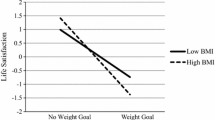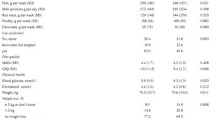Abstract
Nutrition behaviors are governed by health beliefs such as risk perceptions, outcome expectancies, and optimistic self-beliefs. This study deals with the role that objective criteria such as age and body weight might play in forming subjective beliefs. The question is whether they can deter people from forming an overly optimistic judgment of their health risk. Six kinds of verbal judgments were assessed, namely self-reported health, vulnerability toward cardiovascular diseases, nutrition outcome expectancies, nutrition self-efficacy, intentions to change one’s diet, and reported nutrition behaviors. In a sample of 1,583 men and women between 14 and 87 years of age, these judgments were statistically related to age and body weight. It was found that people do take their objective risk status into account, but only to a certain degree. The self-serving bias continues to exist throughout all age groups and weight levels. Moreover, it was found that individuals report better intentions to adhere to healthy foods and better nutrition behaviors as they grow older and gain weight.
Similar content being viewed by others
References
Armor, D. A., & Taylor, S. E. (1998). Situated optimism: Specific expectancies and self-regulation. In M. P. Zanna (Ed.), Advances in experimental social psychology (Vol. 30, pp. 309–379). New York: Academic.
Arnett, J. (1995). The young and the reckless: Adolescent reckless behavior. Current Directions in Psychological Science, 4, 67–71.
Assmann, G. (1993). Lipid metabolism disorders and coronary heart disease. Primary prevention, diagnosis and therapy guidelines for general practice (2nd ed.). München, Germany: MMV Medizin Verlag.
Bailey, K. V., & Ferro-Luzzi, A. (1995). Use of body mass index of adults in assessing individual and community nutritional status. WHO Bulletin, 73, 673–680.
Bandura, A. (1997). Self-efficacy: The exercise of control. New York: Freeman.
Bray, G. (1978). Definition, measurement, and classification of the syndromes of obesity. International Journal of Obesity, 2, 99–112.
Elkind, D. (1974). Children and adolescents: Interpretative essays on Jean Piaget. New York: Oxford University Press.
Filipp, S.-H. (1996). Motivation and emotion. In J. E. Birren & K. W. Schaie (Eds.), Handbook of the psychology of aging (4th ed., pp. 218–235). San Diego, CA: Academic.
Hahn, A., & Renner, B. (1998). Perception of health risks: How smoker status affects defensive optimism. Anxiety, Stress, and Coping, 11, 93–112.
Mroczek, D. K., & Kolarz, C. M. (1998). The effect of age on positive and negative affect: A developmental perspective on happiness. Journal of Personality and Social Psychology, 75, 1333–1349.
Ogden, J. (1996). Health psychology. Buckingham, England: Open University Press.
Perloff, L. S., & Fetzer, B. K. (1986). Self-other judgments and perceived vulnerability to victimization. Journal of Personality and Social Psychology, 50, 502–510.
Rothman, A. J., Klein, W. M., & Weinstein, N. D. (1996). Absolute and relative biases in estimations of personal risk. Journal of Applied and Social Psychology, 26, 1213–1236.
Schechter, S. (1993). Investigation into the cognitive processes of answering self-assessed health status questions (Cognitive Methods Staff, Working Paper Series, No. 2, Office of Research and Methodology). Hyattsville, MD: National Center for Health Statistics.
Schwarzer, R. (1992). Self-efficacy in the adoption and maintenance of health behaviors: Theoretical approaches and a new model. In R. Schwarzer (Ed.), Self-efficacy: Thought control of action (pp. 217–242). Washington, DC: Hemisphere.
Schwarzer, R. (1994). Optimism, vulnerability, and self-beliefs as health-related cognitions: A systematic overview. Psychology and Health, 9, 161–180.
Schwarzer, R. (1999). Self-regulatory processes in the adoption and maintenance of health behaviors. The role of optimism, goals, and threats. Journal of Health Psychology, 4, 115–127.
Schwarzer, R., & Fuchs, R. (1996). Self-efficacy and health behaviors. In M. Conner & P. Norman (Eds.), Predicting health behaviour: Research and practice with social cognition models (pp. 163–196). Buckingham, England: Open University Press.
Schwarzer, R., & Renner, B. (in press). Perceived self-efficacy governing preventive nutrition: A longitudinal study of a community sample. Health Psychology.
Siegel, P. Z. (1994). Self-reported health status: Public health surveillance and small-area analysis. In S. Schechter (Ed.), Proceedings of the 1993 NCHS Conference on the cognitive aspects of self-reported health status (pp. 11–27; Cognitive Methods Staff, Working Paper Series, No. 10. Office of Research and Methodology). Hyattsville, MD: National Center for Health Statistics.
Staats, S., Heaphey, K., Miller, D., Partlo, C. I., Romine, N., & Stubbs, K. (1993). Subjective age and health perceptions of older persons: Maintaining the youthful bias in sickness and in health. International Journal of Aging and Human Development, 37, 191–203.
Steinhagen-Thiessen, E., & Borchelt, M. (1999). Morbidity, medication, and functional limitations in very old age. In P. B. Baltes & K. U. Mayer (Eds.), The Berlin aging study: Aging from 70 to 100 (pp. 131–166). New York: Cambridge University Press.
Taylor, S. E. (1989). Positive illusions: Creative self-deception and the healthy mind. New York: Basic Books.
Taylor, S. E., & Brown, J. D. (1988). Illusion and well-being: A social psychological perspective on mental health. Psychological Bulletin, 103, 193–210.
Weinstein, N. D. (1980). Unrealistic optimism about future life events. Journal of Personality and Social Psychology, 39, 806–820.
Weinstein, N. D. (1982). Unrealistic optimism about susceptibility to health problems. Journal of Behavioral Medicine, 5, 441–460.
Weinstein, N. D. (1987). Unrealistic optimism about susceptibility to health problems: Conclusions from a community-wide sample. Journal of Behavioral Medicine, 10, 481–500.
Weinstein, N. D. (1996). References on perceived invulnerability and optimistic biases about risk or future life events. Unpublished manuscript.
Whitley, B. E., & Hern, A. L. (1991). Perceptions of vulnerability to pregnancy and the use of effective contraception. Personality and Social Psychology Bulletin, 17, 104–110.
WHO Study Group. (1990). Diet, nutrition, and the prevention of chronic diseases (World Health Organization Tech. Rep. Series 797). Geneva, Switzerland: World Health Organization.
Author information
Authors and Affiliations
Corresponding author
Rights and permissions
About this article
Cite this article
Renner, B., Knoll, N. & Schwarzer, R. Age and body make a difference in optimistic health beliefs and nutrition behaviors. Int. J. Behav. Med 7, 143–159 (2000). https://doi.org/10.1207/S15327558IJBM0702_4
Issue Date:
DOI: https://doi.org/10.1207/S15327558IJBM0702_4




